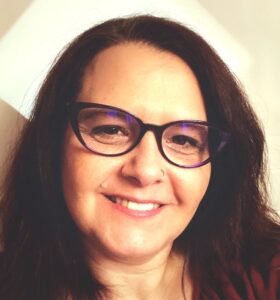
| Locations: Issaquah & Virtual |
| Client Focus: Ages 21+ |
“It matters not what someone is born, but what they grow to be.” – Albus Dumbledore
“It has been my belief for many years that I have been called to work with those challenged by addiction, trauma and other mental health concerns. It is because of my own experiences in life, I feel I will better understand people and be compassionate to their needs.” – Emily
Emily is a licensed mental health counselor (LMHC) and Substance Use Disorder Professional (SUDP) with a Master of Science in Co-occurring Disorder Recovery Counseling from Metropolitan State University, St. Paul, MN. In addition, she is licensed in the State of Minnesota as an Alcohol and Drug Counselor (LADC), Colorado as a Licensed Professional Counselor (LPC) and working toward certification as a sexual addiction therapist. Emily has experience working in outpatient and residential co-occurring settings providing both group and individual therapy services. She has worked with clients with a wide range of concerns including addiction, PTSD/Trauma, depression, anxiety, self-worth/esteem issues, women’s issues, domestic violence, and chronic health.
Since the work of Freud, therapists have been attempting to discover the “best” way to bring about personality change. For Emily, she has an integrative perspective toward the development of therapy that goes beyond one single –school approach. She believes there is no one theory that is comprehensive enough to account for human behavior, especially when there is a wide range of clients with specific individual issues and needs. It would be convenient if a “one size fits all” treatment was possible, however, culturally it is not. Emily recognizes the contributions of biological, psychodynamic, multi-cultural systems, and cognitive-behavioral theories have offered to her practice.
Emily is not a therapist that uses clinical jargon or cliche therapy lines. She aims to be authentic, approachable, and collaborative in her work. She considers the therapeutic relationship to be a high priority. An individual needs to feel the therapist is trustworthy and the environment is a safe place to disclose difficult issues. Without a relationship of trust and communication between the client and therapist, there can be no effective therapy. She believes in treating everyone with compassion, respect, and empathy while offering a safe space for individuals to process their past, present, and future.
Helps with:
- Addiction (Alcohol & Drug and Sexual & Porn)
- Anxiety
- Bipolar Disorder
- Co-occurring Disorders
- Depression
- Religious Trauma
- Self-worth issues
- Trauma & PTSD
- Individuals living with epilepsy.
Therapeutic Approaches
- Person-Centered/Humanistic
- Inner Child work
- Eye Movement Desensitization and Reprocessing (EMDR) Therapy
- Compassion Focused
- Dialectical Behavior Therapy (DBT) Skills
- Seeking Safety
- Mindfulness Skills
- Cognitive Behavioral Therapy (CBT)
- 12 step Philosophy
Certifications
- Certified Sex Addiction Therapist Candidate (CSAT-C)
Additional Training
- A participating member of the Family Advocacy Outreach Network (FAON), a program of the Family Advocacy Division of the National Center for Missing and Exploited Children®.
- A mental health professional serving the Washington Association of Sheriffs and Police Chiefs (WASPC).
